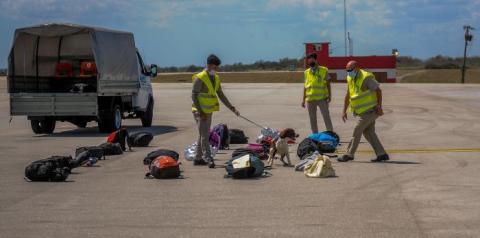
Cocaine production, trafficking, and consumption at all-time highs; marijuana addiction and its harmful effects on health, multiplied by legalization policies in various countries; The global invasion of synthetic drugs and the deficiencies in the availability of treatment for addictions are some of the planetary threats to international, regional and national security, when the International Day of the fight against drug addiction is celebrated this June 26. drug abuse and illicit trafficking.
In its Resolution 42/112, on December 7, 1987, the United Nations General Assembly decided to celebrate that date to show its determination to strengthen action and cooperation to achieve the goal of an international society free of drug use.
The cruel impact of the phenomenon is revealed by the millions of deaths from overdoses and other health consequences in recent years, as well as the health crises decreed in several rich countries and the proliferation of mafias and criminal organizations in all cardinal points, which interspersed with trafficking in arms, people, organs and money laundering.
This business generates more than 500 billion dollars a year in profits at the expense of the pain, instability and slavery of more than 284 million addicted people in the world, between the ages of 15 and 64.
Of that number, 11.2 million people inject drugs and about half live with hepatitis C; 1.4 million with HIV and 1.2 million with both.
The internal tragedy of the United States was recognized a few days ago by the State Department, confirming that
110,000 people died in their country in 2022 from drug use, the vast majority from synthetic opioids, which caused “immeasurable suffering” for thousands of families.
But experts estimate that more than 1,200,000 people in the US have died from fentanyl and other substances. "This is an accumulated figure, but one that we have seen grow in real time," it was reported at an event held this year at the National Autonomous University of Mexico, where it was predicted that "by 2030, if something is not done, there will be two millions of deaths; the figure is going to double” in the superpower.
The executive director of the United Nations Office on Drugs and Crime (UNODC), Ms. Ghada Waly, stated that “production and seizure figures for many illicit drugs are reaching record levels, even as global emergencies are increasing vulnerabilities. At the same time, misperceptions about the scale of the problem and the related risks are depriving people of care and treatment services, and driving youth toward dangerous behaviors."
We must devote the necessary resources and attention to addressing all aspects of the world drug problem, including providing evidence-based assistance to all who need it, and we must improve the knowledge base on the relationship of illicit drugs with other urgent challenges, such as conflicts and environmental degradation, points out the latest UNODC report.
The Report also highlights the importance of mobilizing the international community, governments, civil society and all counterparts to adopt urgent protection measures, including reinforcing the prevention and treatment of drug use and addressing the supply of illicit drugs.
Regarding the first indicators and effects of the legalization of cannabis or marijuana, an unprecedented increase in consumption and people with psychiatric disorders, suicides and hospitalizations is verified worldwide.
It is barely a visible part of the phenomenon that extends to all latitudes and frameworks of the life of humanity.
An editorial published by the Granma newspaper on June 14 cited the Global Crime Trends Report-Interpol 2022, which states that "transnational crimes and criminal networks are evolving at an unprecedented rate throughout the world." , with uncontrolled demonstrations in many of them”, and among the five main threats he points out illicit drug trafficking.
The editorial added that “no country escapes the impact of transnational crime, but Cuba's records –despite the difficult situation they face as a result of the blockade and the hostile US policy. uu. that deprives us of the necessary resources for it – are significantly inferior in all areas”.
As the Cuban authorities have reiterated, there are many threats and challenges that the country faces to face global trends and internal realities. The political will of the Cuban State and its people to confront illicit drug trafficking and the improper use of these substances is defended at all times at the borders, in the depth of the national territory and in broad international, bilateral collaboration and in multilateral forums. .
Cuba's zero tolerance policy has a comprehensive expression in its multifactorial support, a preventive battle par excellence, in which education, culture, health and the family have a main role, but with an inclusive and popular system of confrontation. , born in the Sierra Maestra, when our Commander in Chief Fidel Castro Ruz began to make the Moncada Program a reality, which envisioned eradicating the evils and vices engendered by capitalism and the US neocolony and its mafias.

Leave your comment